Liberalism and the corrosion of haya
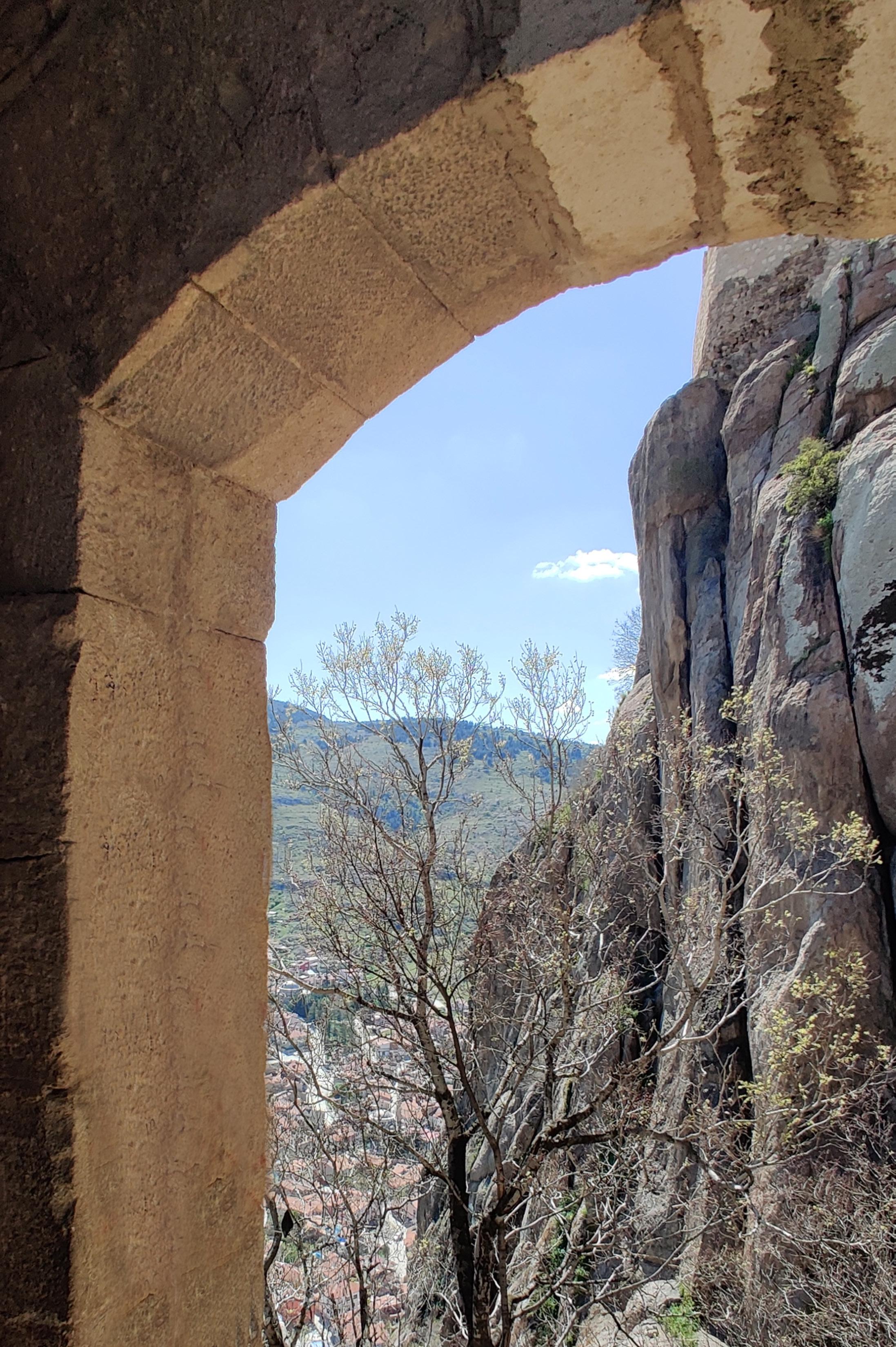
INSIGHT Official Magazine of Darul Uloom CANADA Lighting the Chasm revelation and the ideal marriage Sep / Oct ’23 Volume 1 Issue 5
Stranglehold
about the cover



An arch at the Afyonkarahisar fortress was built on a cone of volcanic rock in the center of Afyonkarahisar in western Turkey by the Hittites in 1350 BC. Later, conquered by the Seljuk in the 13 century, Badrud ding Gevhertas was commissioned by the famed Seljuk ruler, Ala’uddin Kaykabad to build a masjid near the top,

28 34

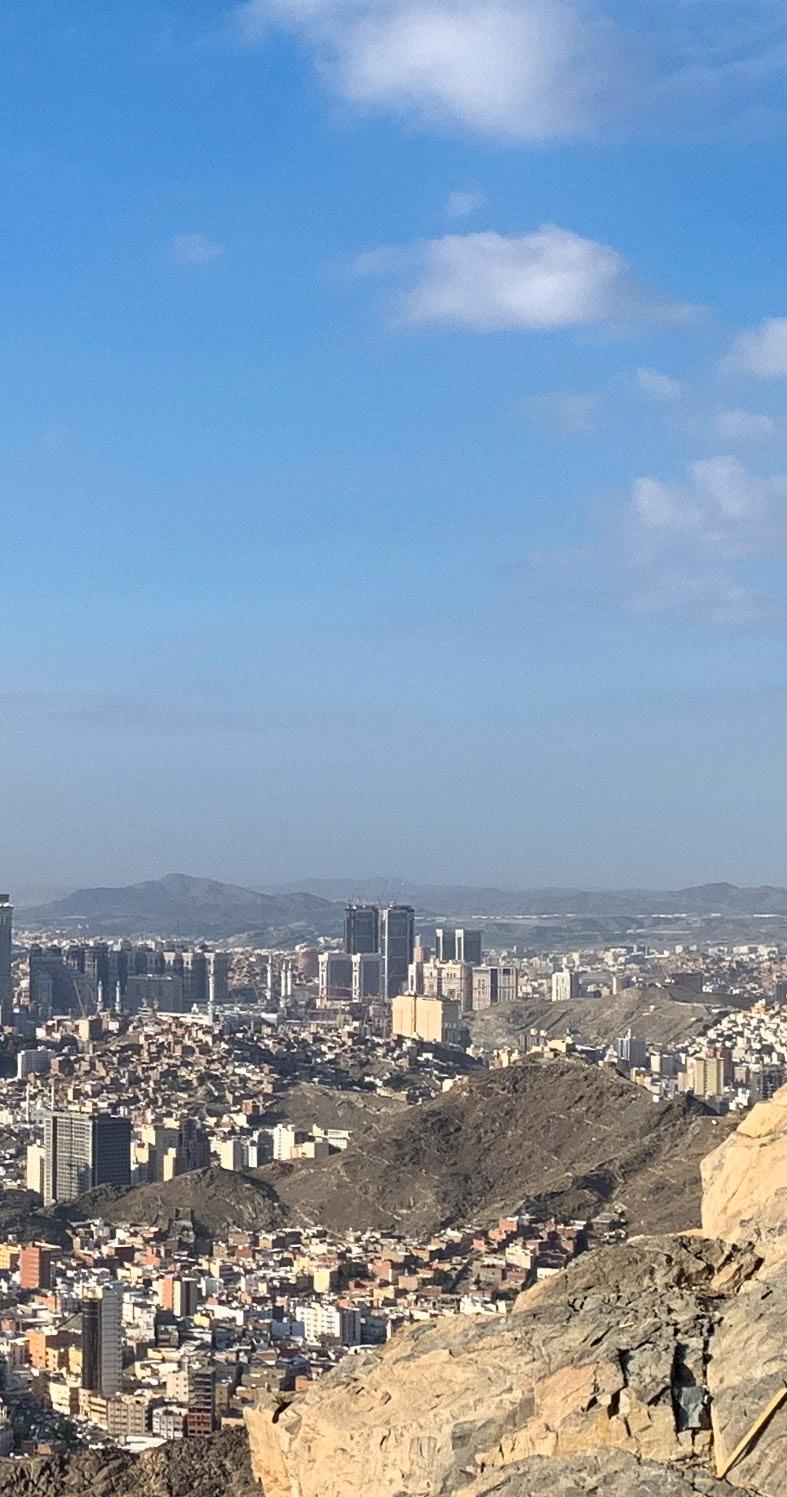

20 6 Seerah 06 OpinionProphesy Whatisanabundanceofdhikr 18 28 20 32 TheliberalismstrangeholdMenonsaddles,orcars?Lightingthechasm Whatabout recreational fishing? LearnArabicIlahandAllah:the connection 34 CONTENTS Fatawa
EDITORIAL
In Lighting the Chasm , M. Dr. Mateen pours over the most exalting moments before, during, and after the archangel Jibril e opened the first communication between the Divine and His creation after 500 years. Thereafter, revelation brought out Khadijah j on one hand and Abu Jahl on the other, the best of the best and the worst of the worst . She was the first to embrace her husband’s message, support his mission, and remain by his side through thick and thin. Our umma is indebted to Khadijah j for helping lay the first bricks of Islam, but in addition, for providing the perfect model of the ideal marriage. Is liberalism as good as we make it out to be with its open-ended approach to our ethnic and religious differences? M. Dawud Alcox argues that the liberalist agenda corrodes our innate sense of haya forcing us to adapt to its perversions. Yes, it offers some benefit insofar as honoring Muslim rights, but it also undermines the rights of Allah by supporting outright deviance. The only way to endorse liberalism then would be to isolate Muslim rights from the rights of Allah. But, how is that ever possible without losing faith? May Allah protect our faith in these trying times.
Patron Hazrat Dr. Ismail Memon
Fatawa
Mufti Husain Ahmad Badri
Contributors
Mufti Omar Baig
M. Dawud Alcox
Maulana Dr. Mateen Khan
Dr. Kamran Karatela
Maulana Muneeb Tahir Uthmani
M. Zubair Ahmad
M. Bakhtiyar Ahmad
M. Ahmad Amin
Abu Saalem
Editor
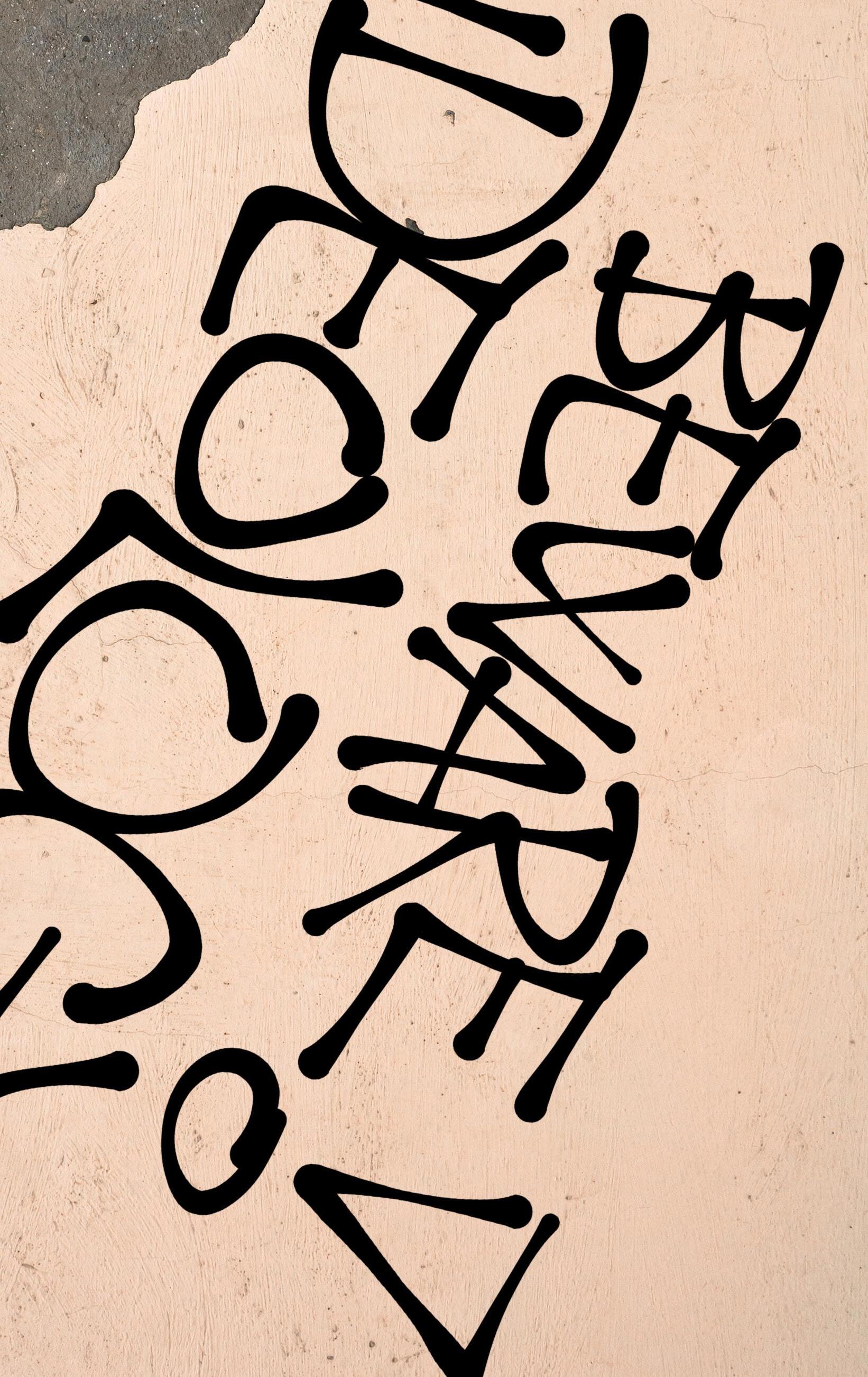
Asim Ahmad
Phone 519 360 1028
E-mail office@ducanada.org
Website www.ducanada.org
Address 51 Prince St. N, Chatham, ON N7M 4J7, Canada
The views expressed in the columns of Insight magazine do not necessarily represent those of Darul Uloom Canada.
The articles published in this magazine may be reproduced with due acknowledgment.
The cause of decay in our society is precisely this: our arguing and squabbling over everything and our rotten behavior. Maulana Shah Wasiullah would say that our terrible conduct has made our homes the proverbial Hellfire. A person runs home tired of the daily grind to relax and gain some peace of mind. But neither is his attitude nice, nor his wife’s, sons’, brothers’, or uncles’ and aunts’ and even his father. Now, the home where bad conduct prevails becomes the proverbial Hellfire and a person gets stressed to no end.
There is no life in material means Understand that there is no enjoyment in life from material means.
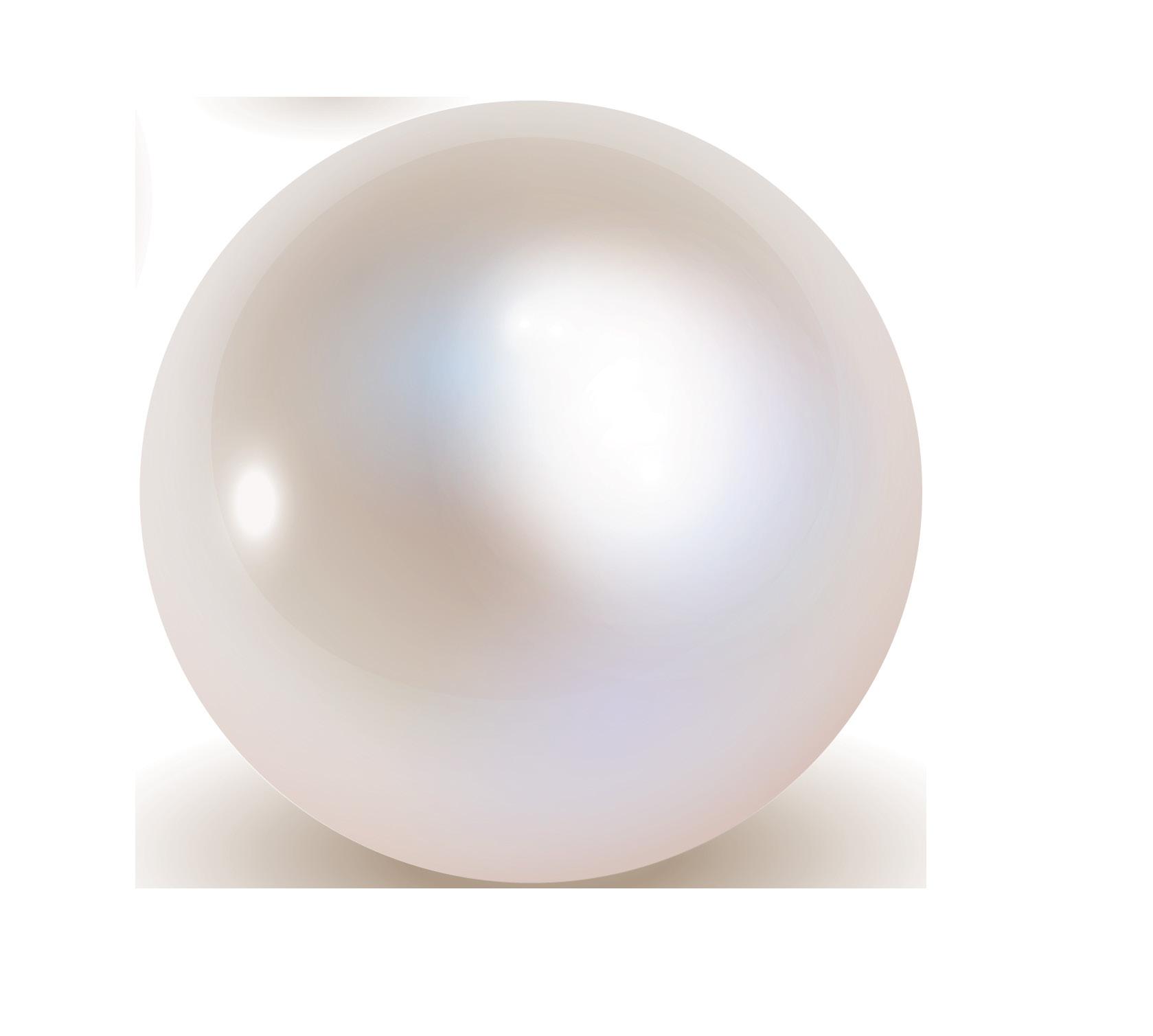

I remember a story of a tycoon who owned millions and had every means at his disposable to live a lifestyle of lavish comfort. Despite all that, he was miserable and deprived of happiness. He ate little and suffered from insomnia. Once, he saw a villager with a huge turban around his head stop under a tree. He removed the turban gingerly and pulled out two thick rotis of sorghum, an onion and green chillis. He cracked open the onion with a blow of his fist and then quite contentedly proceeded to consume the rotis with the layers of onion and green chillis. He also had purchased some bananas, which he ate all on his own and then came to a nearby tube well and drank to his fill. He then pressed the turban down here and there, placed his head on it and fell fast asleep. The tycoon watched this whole scene. When the vil -
lager woke up, he called him and said, “You have the most contented life and are blessed. I’ll give you tons of wealth in lieu of some of this blessing that you have [of contentment]. Can you grant me some of it?” The villager sighed and said, “This is beyond my control.”
Keep the porches clean
The Prophet a ordered us to keep our front porches clean [ nazzifu afniyatakum ]. Where there is an order to keep the porches clean, one will be even more careful about keeping the inside of the home clean since it is closer [to our living area], and once we understand the importance of cleanliness of the interior of the home, then we conclude the importance of keeping the clothes clean and fresh even more so. And then, from the importance of keeping the clothes clean, we derive the importance of keeping ourselves clean even more. And once the importance of cleanliness of the body is understood, which will perish one day, then what about purification of the immortal soul? Whatever maladies exist within the soul will be everlasting; so its purification is even more crucial. So, starting with the porches we arrive at purification of the soul. From the hadith about keeping the porches clean, we realize the importance of the purification of the soul.
OUR AKABIR
- From Fayd Abrar- malfuzat of Maulana Syed Abrar Ahmed

S trangle hol D
by M. David Alcox
magine someone has you in a rear choke, their arm tightly wrapped around your neck, their hand firmly locked, pressing the back of your head forward. You have a few seconds before you lose consciousness. How do you escape?
The Riptide
The weak iman of the present-day Muslim is no secret. Compared to previous generations, the overall interest in the pursuit of Truth seems to have dried up. There are numerous

factors that contribute to this, many of which were identified by the Prophet r himself. Materialism, lewdness, the distortion and repackaging of Islam by public “Muslim” figures among others, are all contributing to the erosion of Islam within the Ummah. But what is the cause?
Due to cultural and ideological sensitivities changing like the tide, many Muslims get carried out by the undertow and dragged into dangerous waters along with the non-Muslims. What begins as
a light stroll on the beach ends up a spiritual death sentence.
Shame on You!
In the age of slogans and mottos, one of the modern, trending mantras is, “Never be ashamed!” Of what exactly? Of anything! SlutWalk, the LGBTQIA+ Pride month and march, Body Positivity (obesity acceptance) and being pro-choice are all examples of inherently evil and unacceptable acts that are being celebrated and gifted immunity from criticism. The claim is that these are expressions of self-identity and as such, need to be affixed to our first and last names. The lack of shame for the above, coupled with a plethora of other societal evils, has given rise to some of the most degenerate characteristics ever seen in human history. The movementt to block individual and social reform has not only kept the cut open but also allowed infection to set in.
Haya

The Prophet r said, “Haya is a branch of faith” [Bukhari]. What is haya? Often the word is reduced to dressing modestly or acting bashfully. While these are undoubtedly examples of haya, by no means do they encompass the word.
A fair definition is: the feeling of distress caused by the consciousness of wrong or foolish behavior.
Hafiz Ibn Hajr defines it thus: “Haya is a traitthat causes a person to re -
frain from something distasteful and prevents him from not fulfilling the right of someone who is entitled to that right” [Fathul-Bari]. Simply put, it is the sense of shame that one should experience when they do something that is unacceptable. The word haya is also attributed to Allah and His Angels. The precise meaning is of course different in these cases, similar to how the word
8 INSIGHT MAGAZINE
salah has different shades of meaning when attributed to Allah, the Angels or humans. One of the names attributed to Allah is Al-Hayiyy (The One with haya). One hadith states, “Verily, Your Blessed and Exalted Lord is Hayiyy, Noble (One Who honourably disdains anything unbecoming of His mercy). He is ashamed that were His servant to raise their hands [in supplication] that He would return them empty-handed”
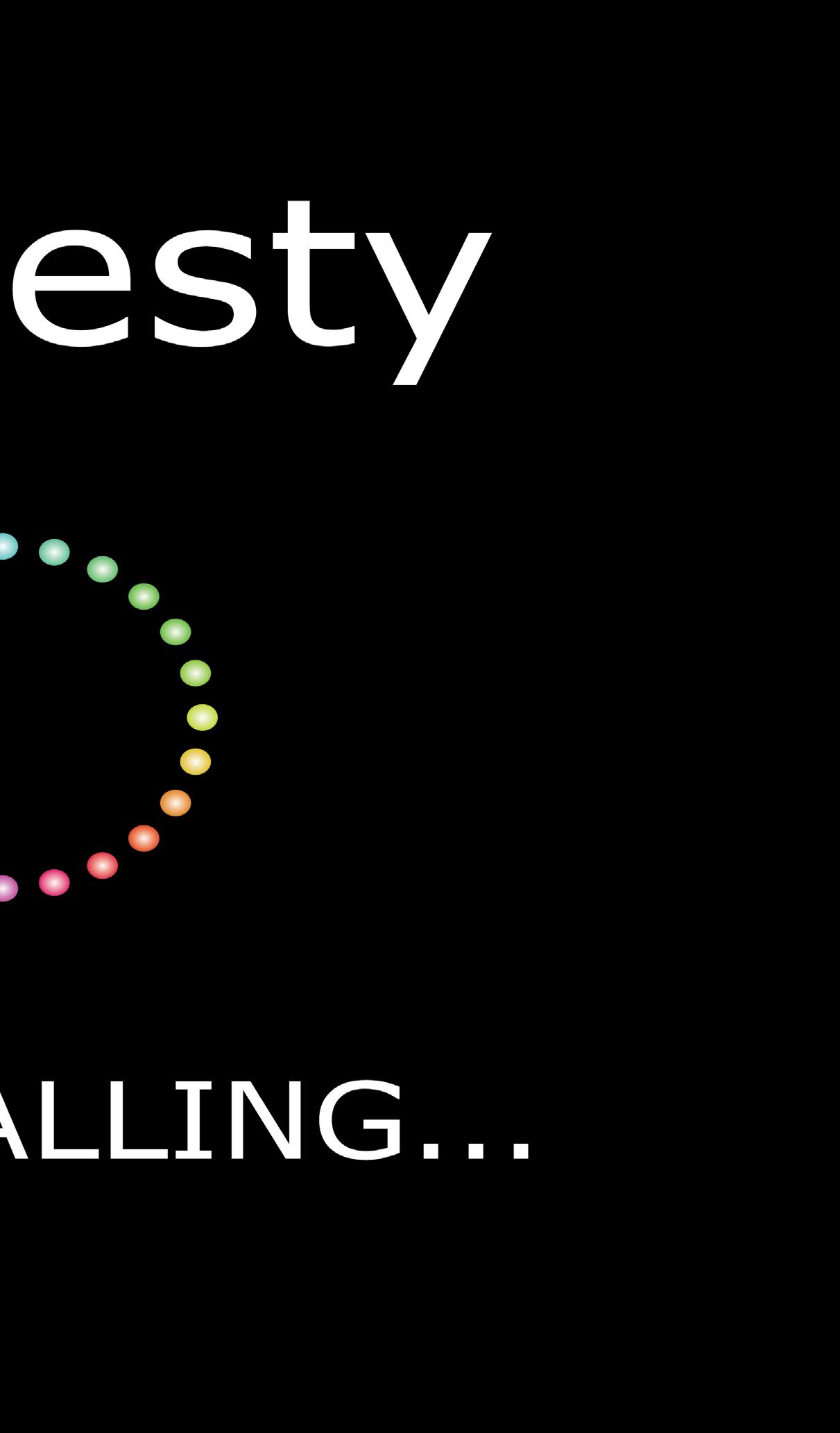
[Abu Dawud]. This is Allah’s haya. The haya that applies to us may relate to social customs such as the unwritten rules and etiquettes of being a host or simply not cutting the line at a Tim Hortons. It ranges all the way to the most significant form of haya, which is having a sense of shame in attributing divinity to anything or anyone other than Allah. The word has a very broad application and is not restricted to simply keeping your clothes on.
Haya, the Special Trait of Islam
The Prophet r said, “Every religion has its distinct characteristic, and the distinct characteristic of Islam is having a sense of shame” [Ibn Majah]. When we consider the above description and application of haya, we see that it can be applied to Islam and iman in their entirety. Allah, in His immense wisdom, has crafted our deen for us in the most perfect way. He has set the rules and regulations and has provided a tool for maintaining them: haya. However, haya didn’t originate from the teachings of the Prophet s . In fact, in a hadith, he himself said, “Verily, of the sayings of the earliest prophetic teachings is: ‘If you have no sense of shame, then do as you wish’” [Al-Bukhari].
Some exegetes make the case that haya can be traced back to the story of Adam e and Hawwa when they ate from the forbidden tree. After Shaytan deceived them, Allah activat -
9 INSIGHT MAGAZINE
The Prophet r
served as a tool for preserving religion, ethics and social customs. It limited the individual’s boldness in transgressing the boundaries, as humans naturally do not want to taint their reputation, whether that be with Allah or with the people. Having a sense of shame has been part and parcel with maintaining moral integrity since the time of Adam e .
The Darkness of the Enlightenment
ed this sense of shame in their hearts, causing a new realization of haya.
Connecting the Dots
Throughout the ages, depending on the time and place, shame was an expected consequence of violating different religious and societal norms. Having a sense of shame for violations of the sacred followed almost logically from virtually every civilization holding a belief in God or an objective truth. You have a purpose, rights to fulfill, customs to obey and responsibilities to a supreme power or higher order. How can you oppose these and not feel a deep sense of shame? This cross-cultural sense of shame
Haya remained an important quality throughout most of human history. Its rapid disappearance in recent times is a modern phenomenon. What happened? People started “using their brains”. The seed of secularism was planted a few hundred years ago in what began the Enlightenment, the great “Age of Reason”. It germinated and was tended to until it ripened and could even be transplanted cross-culturally. The vision of secularism was to establish Liberalism and phase out all religious institutions effectively. In short, the goals of liberalism are individual autonomy (freedom), equality and the protection of rights. On paper, this may sound like a harmless vision. However, when we dissect the liberal definitions of words like equality, rights and freedom, we realize they have strong ideological implications and as -
10 INSIGHT MAGAZINE
said: “Every religion has its distinctive mark, and the distinctivemark of Islam is having a sense of shame”
[Ibn Majah].
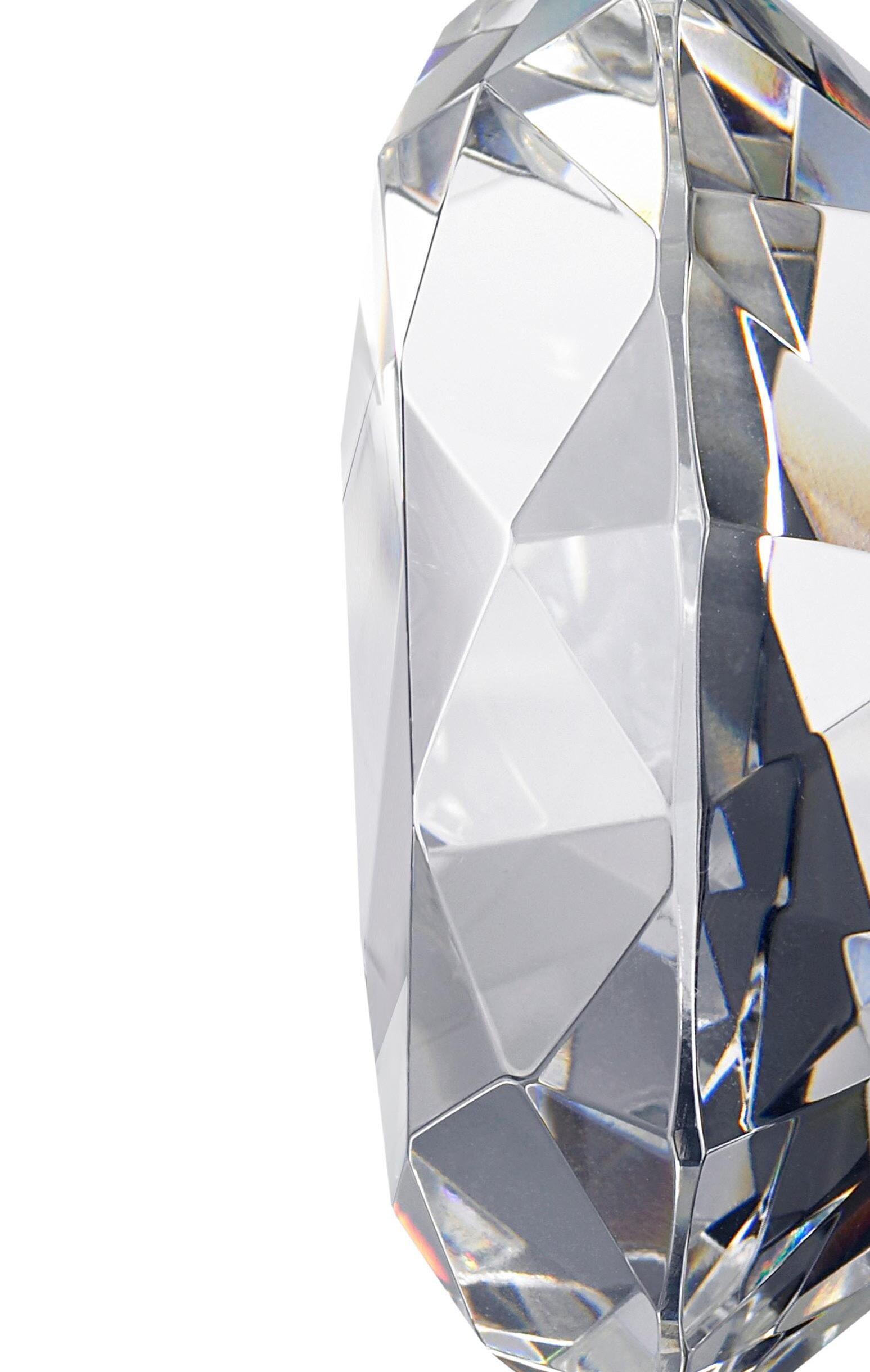
You’re far more precious than diamonds and pearls, and you should be covered too.”
- Muhammad Ali [to his daughters]


Modesty is half
that we’ve always had the truth, where as progressive modernism posits we will never be able to actually capture it. It’s always running ahead of us. The question then becomes, why have the Muslims lost so much of their sense of shame? Shouldn’t Islam and its mechanism of haya prevent the Muslims from the secular pitfalls? Instead, in masses, Muslims are not going to the masjid regularly. They are involved in fornication, using drugs, watching pornography and generally living unislamic lives. “Halal” shops sell haram things. The Muslims in the YouTube comments section act as though the Recording Angels aren’t logged in and watching attentively. In high schools, when the time for prayer comes and goes, Muslim students aren’t ashamed.

Bound Together
The Prophet s said in a hadith, “Sense of shame and faith are bound together. When one of them is removed, the other is removed (with it)” [Al-Hakim]. Imagine you get a rash and it causes you to itch. The more you scratch, the more
the rash spreads. The more it spreads, the more you need to scratch! Similar is the case of haya and iman. This self-perpetuating dyad can slowly lead someone to full blown kufr. It starts with toning down the haya a bit because, “when in Rome”, right? You don’t want to be the odd one out who has a problem with everything. This causes a decrease in iman. This decrease in iman lowers your sense of shame. The process continues until you have no sense of shame left and as the hadith goes, “If you have no sense of shame, then do as you wish!”
How Low Can You Go
The Prophet s told us that the lowest level of iman is to consider something evil in our hearts. If we cease to detest evil, we don’t even have the weakest form of iman. Do the math! Where does this lead?
The Messenger of Allah s told us: “Every one of my followers will be forgiven except those who [boldly] publicize their sins. An example of this is that a man commits a sin at night and there -
half the Faith
after wakes up in a state that Allah has covered that sin for him. Then, he says: ‘I committed such and such sin last night,’ while Allah had kept it a secret. During the night, Allah has covered it up, but in the morning, he removes the cover provided by Allah” [Al-Bukhari and Muslim].
This type of behavior shows a complete abandonment of haya and a belittlement of Allah’s authority. It leads to boldness and even the active propagation of sin.
A Disbelieving Muslim
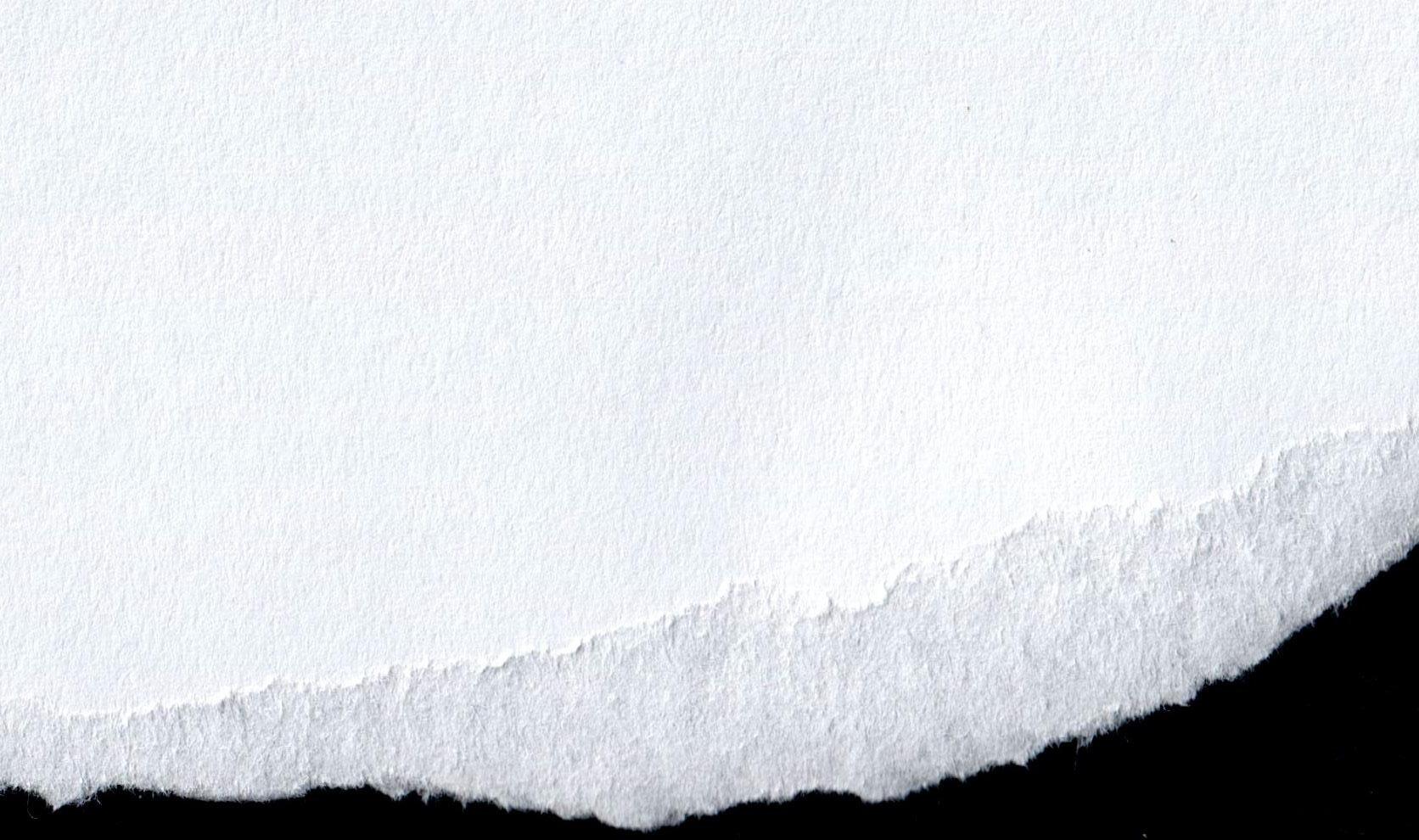
A “Muslim” in such a state has limited options. Haya being the inseparable trait of Islam, it is near impossible to live comfortably when in your own mind and among Muslims you are deemed evil. Most will not be able to remain in this state due to the extreme confusion and depression they experience. Many times, it leads them to apostate or to move up the ranks in shamelessness, distorting Islam to jus -
tify their actions. This self deception helps them shed the shame. Either adopting liberalism fully or concocting a liberal remix of Islam seems like a problem-solver. This is the secularization of Muslims.
Common “Muslims” with little knowledge of Islam try to cast shade on the hadith traditions and butcher the Qur’an with their exegesis version because they want to be Muslim and not feel ashamed of their evils. Thus, they either interpret the shame-bearing verses away or just deny their applicability so it doesn’t conflict with their personal autonomy. We have the “Muslim” politicians who play the same tune but whose audience is much greater. Individuals like Humza Yousaf (not Hamza Yusuf), the first minister of Scotland, is a self-identifying Muslim politician in the UK who does a wonderful job of misrepresenting issues of legal consensus among Muslim jurists. He
is famous for his brave and monumental quote that he can’t change what’s in scripture, but what he can do is not allow pers onal faith to be the basis of legislation — that gay sex is not a sin and is equal to heterosexual marriage, among other heteredox statements.

Staying Dry in the River Muslims who immigrate to the West and those who grew up here usually have good intentions when it comes to playing the secular institution game. They want to keep their Islamic traditional values while also ben efiting from the wealth of the West. The important question truly is, can one play the game without losing something?
If we carefully analyze the Muslim presence in western secular society, we will notice a gradient. We have those who only participate in the bare minimum of secular-specific societal activities. These are the practicing, masjid-going, sunnah
loving, Islamic homeschooling-type Muslims who are aware of these critical issues. They try to stay clear while still living in secular society. They are on the shore of a river. The splash of the rapids gets on their clothes, and the bottoms of their feet get wet. Then we have those who identify as Muslims, don’t go to the masjid, if at all, and don’t prioritize Islam over anything. It’s an identity. They are very active with anything secular, such as politics, economics, marches and activism, secular education, the corporate world, social media, etc. They devote all their time and assets to these areas. They are swimming in the middle of the river, their bodies and clothes soaked. They are swallowing it up. And of course, we have the Muslims who fall in between.
The point is that the gradient represents how much each group is being
affected by secularism. None of them are completely safe and out of harm’s way. The more one participates, the more they are affected.
How to Get Out of the Choke
Before you go searching YouTube for choke escapes, as a Jiujitsu coach, I can tell you this: you don’t! Once you are that far gone, the solution is to realize that you should have fought it off from the onset. You should have been blocking the choke arm before it circled around your neck. You should have been watching your back in expectation of your enemy.
As the imam of a masjid, I am frequently asked by parents how to get their 18-year-old child out of the choke. The answer is unfortunately the same. Alright, there is a way out, there is hope, but it’s not easy. It’s a game of inches and du’a.

If we reverse engineer the problem, we
conclude that we and our families need to be in an Islamic environment for the vast majority of our time and ensure that our diet content is Islamic. This is the only realistic solution. We need to reverse the secularization process within us by adding Islam back in. Within the Islamic environment, the sense of shame will return. Islamic content (books, articles, games, videos, etc.) and practices (going to the masjid, reading and learning the Qur’an, listening to religious talks, making Muslim friends, etc.) will re-establish haya as an integral part of maintaining our religion. Bringing deen into our lives will re-infuse the Ummah with the most beautiful characteristics enjoined upon us by Allah and His beloved Prophet r . The more we reclaim our haya, the more our iman, in sha Allah, will increase.
May Allah enable us to carefully diagnose this problem and make the changes before it’s too late. Ameen.
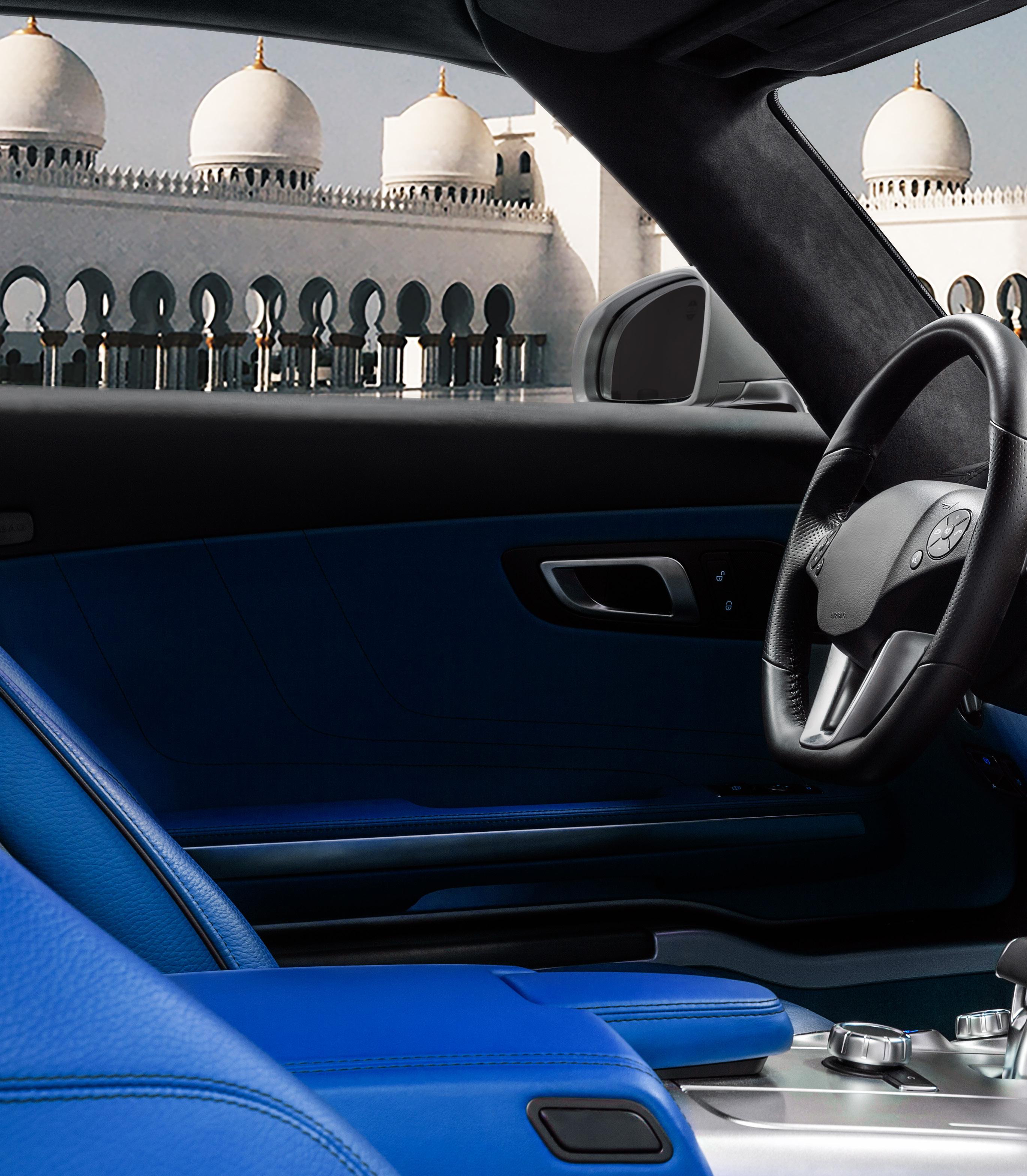
Prophesy

A time will come when men will come riding on cushions/saddles until they reach the doors of the masjids. Their women will be clothed, bared...
al-Mustadrak, 4/484
Seerah
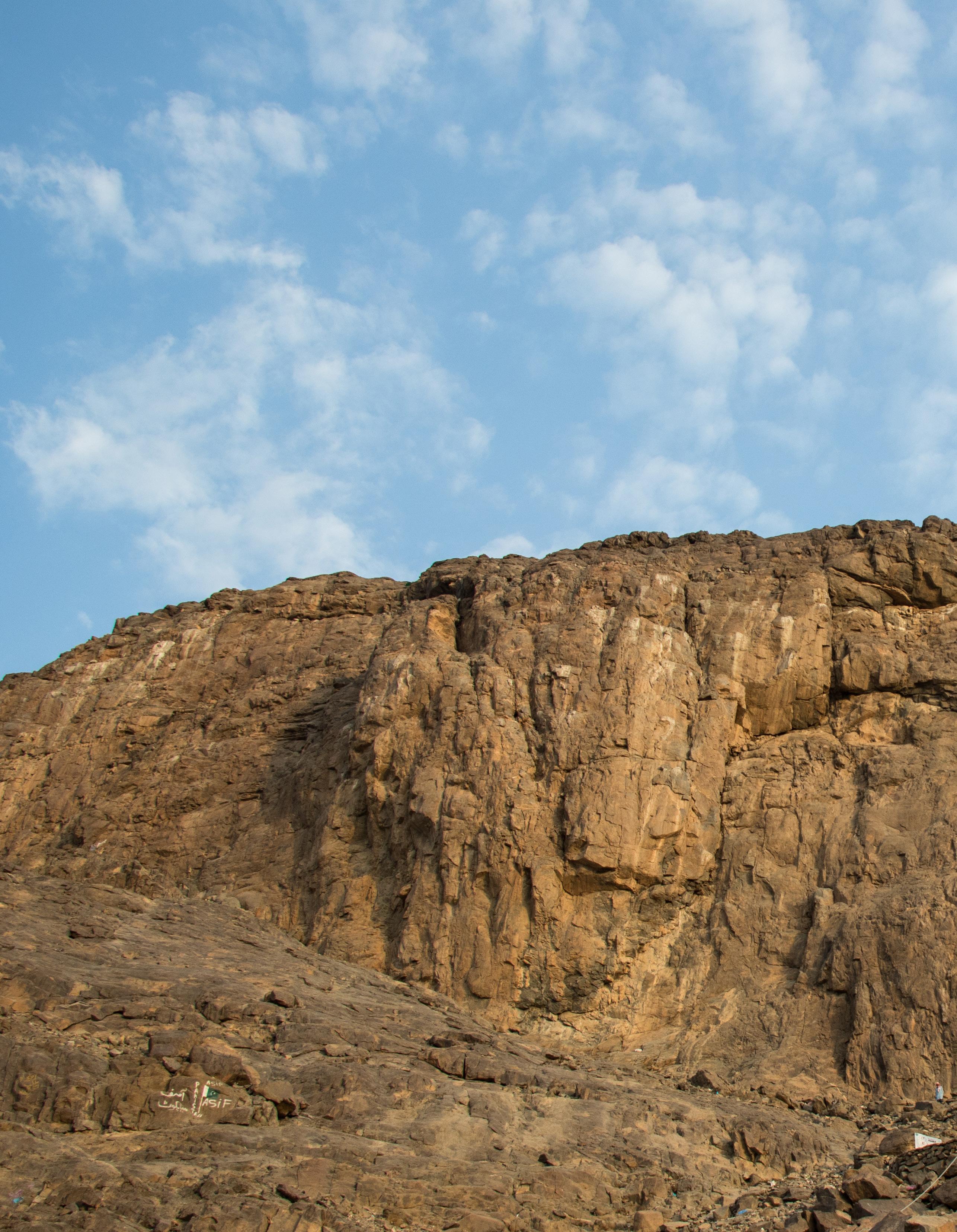
A sound like a bell’s ringing reverberated shaking them to their core. The it as they fell unconscious. It, arrived. They awoke to their Messenger among the angels, them.
They inquired, “What did our Sayyiduna Jibril responded,
Lighting the Chasm
 by M. Dr. Mateen Khan
by M. Dr. Mateen Khan
reverberated the heavens
The inhabitants therein recognized
It, the sound of revelation, finally their hearts’ trembling, finding the angels, Sayyiduna Jibril, standing before our Lord say?”
“The Truth.”
Allah, the Exalted, created the heavens and the Earth for humans, and He created humans, in turn, for His submission. It was decreed that humanity could only climb the mountain of complete submission in stages. Our father Sayyiduna Adam began the trek up this mountain when humanity was still nascent. People sometimes made great strides by following the leadership provided by expert guides Allah sent. At other times, humanity fell until another guide arrived with a light to lead them again up the mountain. However, the deepest chasm along the climb was near the top, and mankind had fallen into it as dark clouds gathered over them. Tawḥid was lost. Immorality was
the norm. “Allah” was a name known but not effectual. People pulled away from Him, their Sustainer, and alienated themselves from the guidance of His past prophets. The names of Ibrāhim, Isma`il, Mūsā, and `Īsā still echoed, but the core of their messages was perverted. As humanity lay in the chasm’s darkness, its final ascent to the peak was prepared by the meeting of two Messengers.
Our beloved Muhammad s sat engulfed within the shade of Hira’ in contemplation of his Lord. It was the month of Ramadan, the month of mercy. Suddenly, a magnificent being, an angel, presented itself. Having neither seen, heard, nor experienced anything like it, the Prophet s was immediately overcome with awe and trepidation. His heart
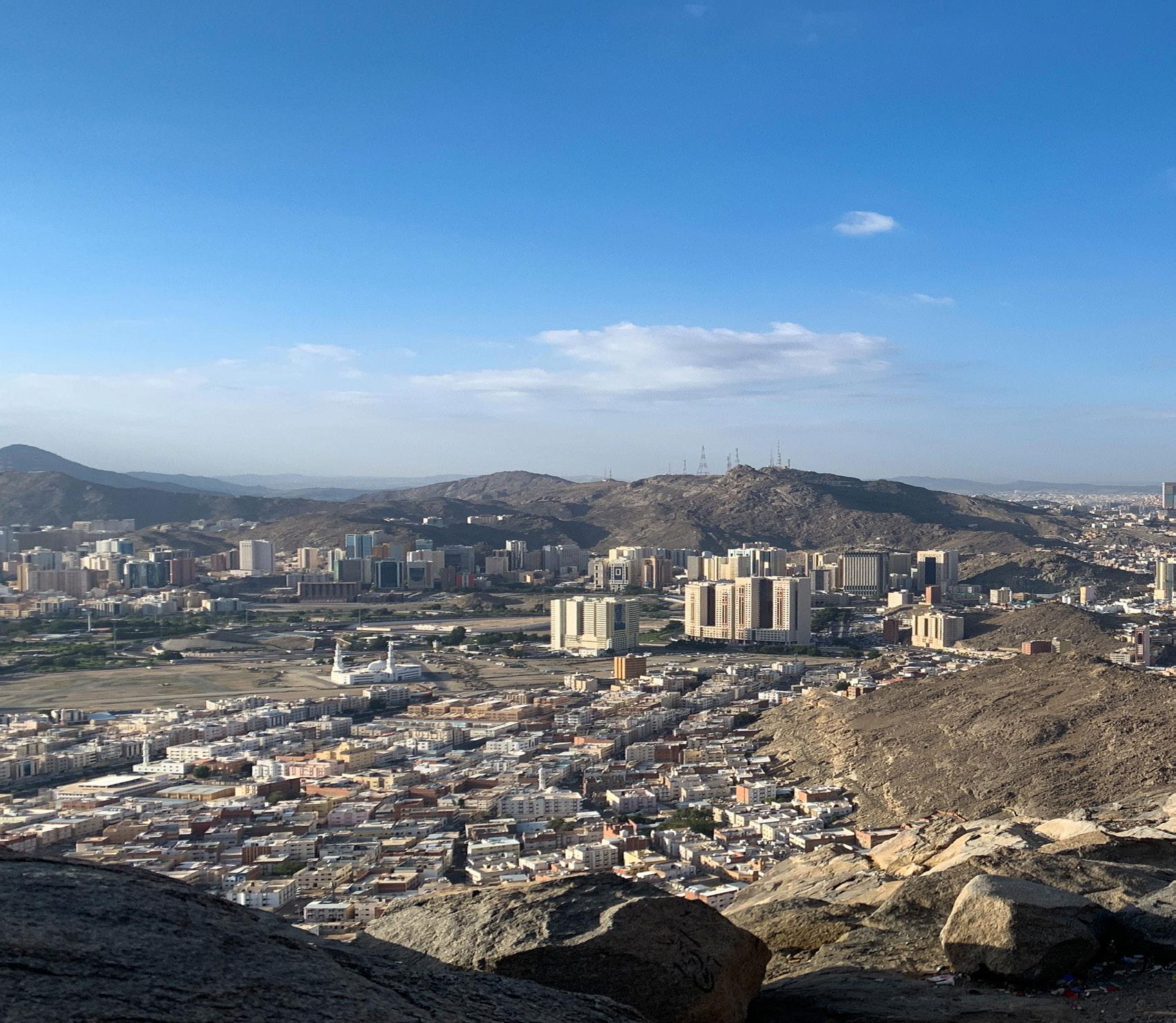
22 INSIGHT MAGAZINE
quivered, and his voice abandoned him. How is one to prepare for such an encounter? Even a heart so pure is still bound by human limitations. The angel after addressing him with salam bid him, “Recite.” The Prophet s said, “I am unable to recite.” The angel now embraced him forcefully and, upon release, said, “Recite.” He, visibly affected, responded, “I am unable to recite.” The angel brought him closer and tighter this time and again, “Recite.” The word felt heavy, like a weight on every cell of his body, “I am unable to recite.” The third embrace grew even tighter as if to complete transference of angelic qualities from one heart to another: “Recite with the name of your Lord who created everything. He created man from a clot of blood. Recite, and your Lord is the most gracious, Who imparted knowledge by means of the pen. He taught man what he did not know.” (Al‘Alaq 1-5)
With this first revelation, the Messenger s would never be the same. From the beginning, he was born with a pure soul and inclined toward only good. Just as Allah, the Exalted, said in a ḥadith qudsi “I have created my servants as true Believers (hunafa’),” and the Prophet s was the truest of them. The revelation, at once, shook his being and cemented his nature. Not knowing what else to do, he mustered what strength was left, and with a pounding in his chest, he returned home. “Cover me, cover me,” he weakly
responded as he entered his abode. His family rushed to him, fearing his collapse, wrapped him, and awaited his recovery. A short while later, his body salvaged itself from the event. He opened his eyes, turned to his wife, and said, “O Khadijah, what happened to me?”
They finally came together like two waves traveling from two ends of the Earth. It was the first meeting between Muhammad s the Messenger among men and Jibril the Messenger among angels. The Earth touched the Heavens. The Seen encountered the Unseen. The two would pray together, recite the words of their Lord to one another, and even fight alongside one another. The Prophet s looked forward to their meetings, so much so that if Sayyiduna Jibril did not arrive at his scheduled time, the Prophet s grew concerned and restless. No doubt, the angel reciprocated this love and attachment. The
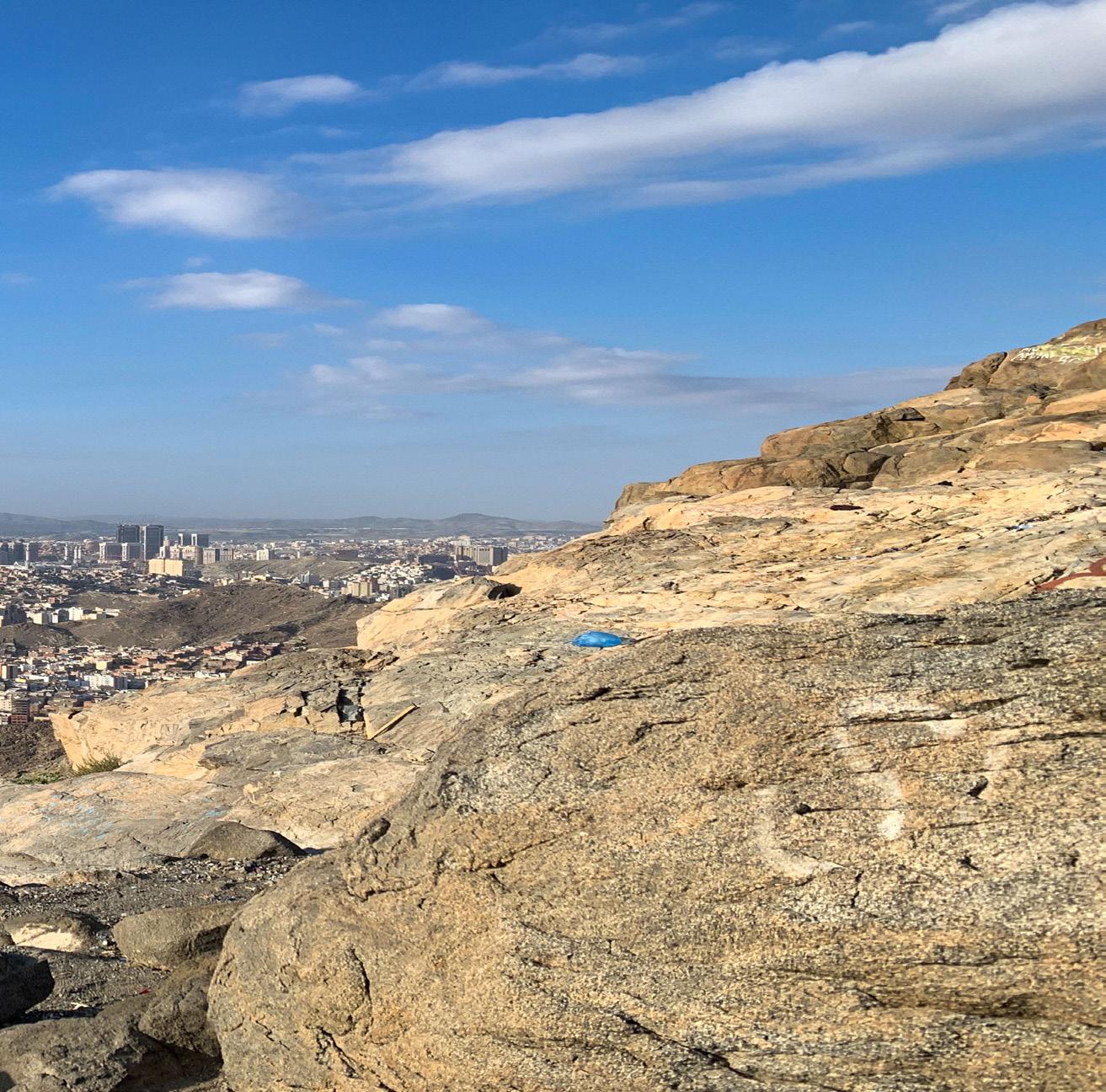
23 INSIGHT MAGAZINE continued on p. 30

24 INSIGHT MAGAZINE

25 INSIGHT MAGAZINE
created universe had never seen the likes of this bond.
The Supporting Spouse
With trepidation that was fully human, the Prophet s confided to Sayyidah Khadijah what happened. “I fear for myself,” he said. She replied with the confidence of one who knew him intimately, “Do not. Rather, be pleased. By Allah, He will never humiliate you.”

Every culture has multitudes of love stories, but none as deep and real as this one. Sayyidah Khadijah was wise in her years and intelligent. She proved herself to be an excellent judge of character when she married the Prophet s. They had built a warm, inviting home where she was available and attentive. When the Prophet s walked through the doors in his greatest time of need, she was there to assist him. The events he witnessed validated her thoughts: he is to be the Messenger of Allah. Still, he worried and felt unease. His emotions were difficult on her and drove her to confirm her thoughts with three individuals: ‘Addas, the Christian slave of ‘Utbah ibn Rabi’ah, Bahirah, who met him in a previous visit years ago, and Waraqah, Khadijah’s Christian uncle and scholar of the
previous testaments. One echoed the other saying, “Yes! The one he met is none other than he who serves as the conduit between Allah and His Prophets!”
Waraqah listened to the story closely as his wrinkled face winced. His emotions swelled within him. He had lived a lifetime of longing and accumulated an ocean of knowledge. All that effort for the sublime honor of recognizing the long-awaited messenger of the Divine for the world. “Indeed, you! My dear nephew, you are the one the son of Mary told us about! You are the Messenger sent! If only I had the strength of youth again, I would support you when your people will expel you.” This must have struck the Prophet s hard. His people had only shown him affection. Everyone in his home, tribe, city, and beyond loved him. He— the truthful and trustworthy, the one whom tribal leaders were overjoyed to see—would be thrown out by them?! Such is the burden of Truth. Waraqah kissed the forehead of the Prophet s as they separated. He passed away soon after, having fulfilled his life’s mission. His love and respect for his nephew earned him Allah’s respect, for the Prophet s later saw Waraqah surrounded by Jannah. The Prophet
26 INSIGHT MAGAZINE
Every culture has multitudes of love stories, but none as deep Sayyidah Khadijah was wise in her years and intelligent. She character when she married the Prophet s. They had built a warm, inviting home where she was available walked through the doors in his greatest time of need, she was
s had known from the first meeting with Jibril that he was the Messenger of Allah. There was no mistaking it, for he saw the angel with his own eyes and felt the imprint of his embrace. The meeting with Waraqah and his wife’s loving efforts comforted his unease, and they returned home.
Allah’s Mercy
Allah, the Exalted, allowed the newly appointed Messenger s some time to adjust. Even a heart and soul as pure as his needed time to process what occurred. This was revelation, after all. Its weight causes the strongest camels to kneel and even exudes sweat beads on the highest Prophets. Soon, the adjustment period passed, and longing set in. He was a Messenger, but where was the Message? He grew anxious waiting. He wandered about, pondering. He found himself atop mountains, contemplating. Whenever his thoughts became their worst, Sayyiduna Jibril would come into sight to put him at ease, saying, “O Muhammad, you are truly the Messenger of Allah.” When he would return to his wife, she would remind him of the
same. Allah, the Merciful, had blessed His beloved with two powerful pillars to stand upon: a ghaybi one in Jibril and a ẓāhiri one in Khadijah. May Allah bless them all and grant them peace.
Thereafter, he felt comforted for a time until unease settled in again. This is how he went about until one day, a sound from the sky rocked the ground below, and he beheld the magnificent angel upon a throne on the horizon. The Prophet’s humanity again overtook him. He hurried to his family. He lay covered, waiting for his body to recover like last. Instead, his Lord revealed to him:

“O you, enveloped in a cloak, stand up and warn, and pronounce the greatness of your Lord.” (Surah al-Mudaththir 1-3)
From then, the clouds receded, and the sun showered continuously upon him. He, a mercy to the universe, began to quietly light the people’s ascent out of the chasm’s darkness.
27 INSIGHT MAGAZINE
deep and real as this one. She proved herself to be an excellent judge of available and attentive. When the Prophet s was there to assist him.
If a person is traveling by plane from one place to another, how should he pray his obligatory prayers? Would it be permissible for the traveler to delay or dismiss the prayer till he reaches his destination? Can a person pray while sitting?
The procedure of praying salah on a plane is the same as praying salah on the ground. Praying salah with tayammum, dismissing the salah, or praying the fard salah while sitting unnecessarily (without valid reasoning) will result in the salah being invalid. However, one can pray sitting if he is incapable of praying while standing due to lack of space or if one is prevented from praying on the plane. In these specific situations, once a person has landed or is permitted to leave the plane at a stop, he should repeat the salah on the ground.
Should a person pray the sunnah mu’akkadah prayers as a musafir (traveler)?
If a person has already reached his destination, or is not hastening to reach his destination, he should preserve the habit of praying the sunnah mu’akkadah prayers along with the obligatory prayers. If a person is on active travel, he should try his best to pray the two rakah before Fajr due to the emphasis the Prophet s laid on it along with the
rest of the sunnah prayers. However, one is permitted to leave the other sunnah prayers.
What is the way to dispose of religious papers? Do we burn them, recycle them, or shred them? What is the correct and practical way of doing so? Is it ok to recycle, shred and recycle or garbage?
It should be known that copies of the Qur’ān, the names of Allah, the Prophets, and the angels should be dealt with the utmost respect. The practical ways of putting away such papers are:
1.Burying them. This is the most respectful way to do so.
2.Erasing the name of Allah, the Prophets, and the angels.
3.Burning or shredding the papers which have the name of Allah, the Prophets, or the angels.
4.Putting them in an area where any form of impurity does not touch them.
5.Shredding papers of the Qur’an and transferring them to a recycling company. Whichever method a person finds most suitable/respectful, they may do so. may do so.
28 INSIGHT MAGAZINE
fatawa
Mufti Husain Ahmad Badri
Q:There are some men in our family that apply henna on their hands and feet at weddings, Eid, and other special events. My question is would it be permissible for men to apply henna/ mehndi? Is there any mention of it in the ahadith prohibiting it?
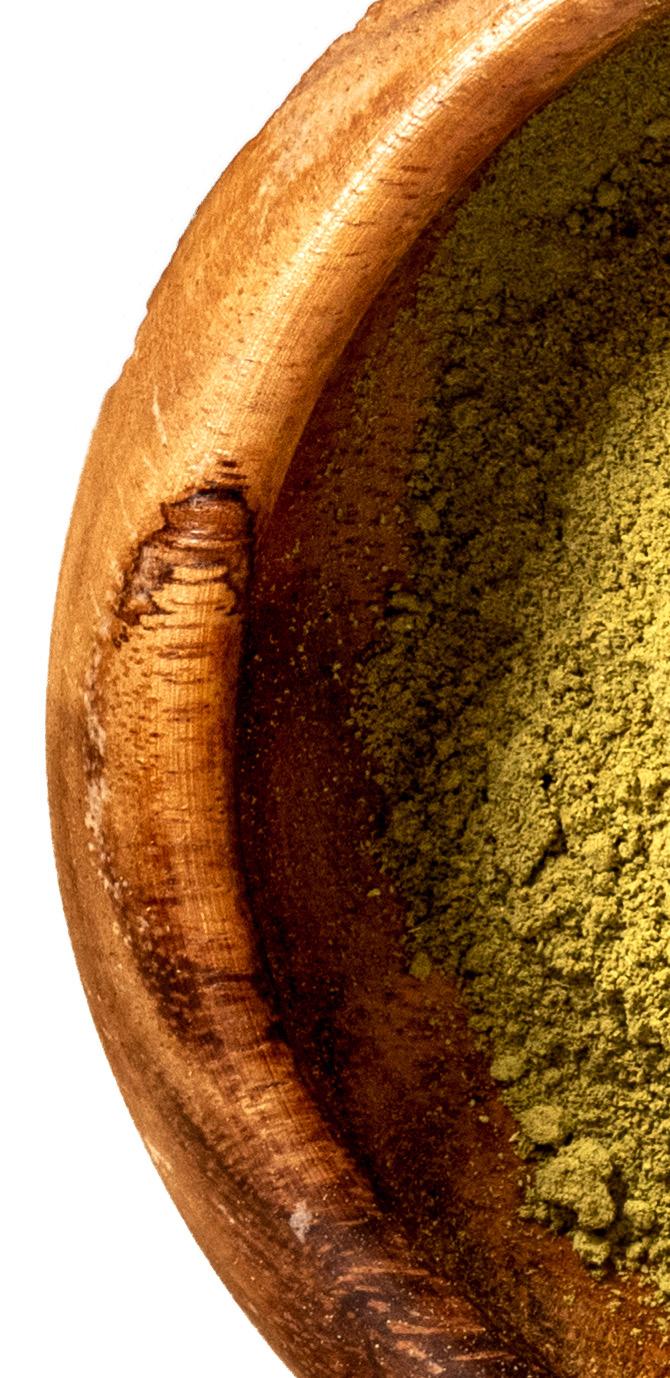
A: In principle, it is not permissible for men to apply henna/mehndi on their hands or feet. It is mentioned in a narration of Abu Dawud that an effeminate man (mukhannath) who had dyed his hands and feet with henna was brought to the Prophet s and he disapproved of it.
Moreover, it is mentioned in various ahadith that the Prophet s forbade one gender from imitating the other. The following hadith states: Ibn Abbas j narrates that the Messenger of Allah s cursed the women who imitate men and the men who imitate women (Tirmidhi).
. Is it permissible to wholesale houses?

Real estate wholesaling involves finding discounted properties from motivated sellers and getting them under contract with the intent of assigning the same contract to another buyer while collecting an assignment fee or simply re-selling the property to another buyer at a higher price. For example, Zaid is selling a house for $200,000. Bakr who is the real estate wholesaler acquires a temporary contract from Zaid. This allows him to assign the same contract to another person by a certain date. ‘Amr was looking to buy a house; hence, he informs Bakr to find a suitable home for his family. Therefore, Bakr shows him the aforementioned property and states the price to be $225,000. The house meets ‘Amr’s requirements; thus, he buys the property for the price stipulated by Bakr. Zaid (the owner of the house) receives $200,000 and Bakr collects $25,000 as an assignment fee.
From an Islamic perspective, Bakr (the wholesaler) can be deemed an agent who is collecting a fee for his service to ‘Amr (the ultimate buyer). Since there are no unlawful elements found in such a transaction, it would be permissible to wholesale real estate.
I understand that the distance of safar is 48 miles or 77 kilometers. My query is; would the distance be calculated from one’s residence or the city limits?
In reference to your question, the distance of travel (48 miles or 77 kilometers) is calculated from the boundary of one’s residential city to the boundary of the city/town one intends to go to.
Is it permissible to slaughter animals by the vertical cutting method or Modified European cut?
The vertical cut, also known as the European cut or thoracic sticking is when the slaughterer makes an incision near the heart, cutting the brachiocephalic trunk (severing the connection between the rest of the arteries) and moving upwards towards the throat.
The modified European cut has the same procedure as the vertical cut with the addition of a horizontal incision severing the two jugular veins and partially puncturing the trachea.
In many countries and slaughterhouses, captive bolt stunning (which could render the animal dead before slaughter) is used on the animals before the vertical cut or modified European cut.
The valid slaughtering method according to Islamic law is to cut the esophagus, trachea, and the two jugular veins. The animal will also be halal (considered to be slaughter correctly) if three of the four mentioned above are cut.
Therefore, the vertical cut and modified European cut will be impermissible for the following reasons:
1. Use of captive bolt stunning
2. Did not cut the jugular veins directly (for vertical cut only)
3. Inability to cut a minimum of three out of the four vessels
30 INSIGHT MAGAZINE
Is fishing and recreational fishing permissible?

It will be permissible to fish with the condition that there is intention of making a livelihood from it or for consumption. If one catches a fish not suitable to the fisher’s standards, it will be permissible to release it back in the water.
However, recreational fishing involves catching fish and releasing it back in water for mere pleasure without any intention of keeping the fish. This results in an increase in the mortality rate anywhere from 5-30%. Ibn ‘Abbas h reported Allah’s Messenger s having said this:
“Do not make anything having life as a target” (Muslim).
Therefore, it will be impermissible to par-
ticipate in recreational fishing.
If a woman has a piercing on her nose or ear, will she have to make sure water reaches the hole for wudhu and ghusl? In relation to the aforementioned question, it will be necessary for water to enter through the pierced hole in the ear or nose. If water does not enter the piercing while it is intact, then it will be compulsory for a person to move the piercing in a way that the water enters through it or remove the jewelry. It is mandatory for water to enter through any hole from a piercing for a fard ghusl while it is only mandatory for water to enter through the nose-pierced hole for wudhu.
31 INSIGHT MAGAZINE
Is
Ilóh
means god, but al-Ilóh means Allah, the Supreme. Abu al-Haytham said that something is not ilóh until it is worshipped as a Provider, Creator, and the Almighty by its worshipper .
al-Aliha
plural of ilóh, means idols; deities .
Allóh
from aliha ya’lahu, according to another opinion, which means to be in awe of because ‘the servant is in awe of His magnificence’; or, aliha ya’lahu iló, to take refuge in, and Allah is a refuge from all our fears and needs,
Wilóh
is the root of ilóh, but the wa changed to a hamza. It means: they seek refuge in Him for all their needs [ anna al-khalqa yaulahauna ilay fõ úawó’ijihi ] like the child that seeks refuge in his mother [ yaulahauna iló ummihõ ].
al-Alõha, alAlóha
the sun since Arabs worshipped the sun and assigned divine attributes to it.
Allóh
according to another opinion is from ilóh (on the form of fi‘ól but in the meaning of a passive participle); ma’lñhun, i.e. one who is worshipped.
Ulñha-ilóhata
means worship [ibóda]. Ibn Abbas k read the aya: wa yadharaka wa ilóhatak instead of wa ólihataka [7:127], (the minister of Pharaoh said to him) Will you leave Musa...to abandon you and worshipping you [original tr: and your gods ]. Ibn Abbas explained: Pharaoh was worshipped [and not a worshipper of gods]; and thus, the reason for his reading of the ayah.
Allóh
The Nahw master Khalil is of the opinion that the hamza in the beginning of the Supreme name is inseparable from the lam. By that, he means to say that the Supreme name is not derived from any root like His other attributes [e.g. Raúmón, Raúõm].
32 INSIGHT MAGAZINE Learn Arabic
a-la-ha the root of Allah or is the Supreme name independent of any root? Below are a few derivatives of a-laa-ha and its relation with the Supreme name.
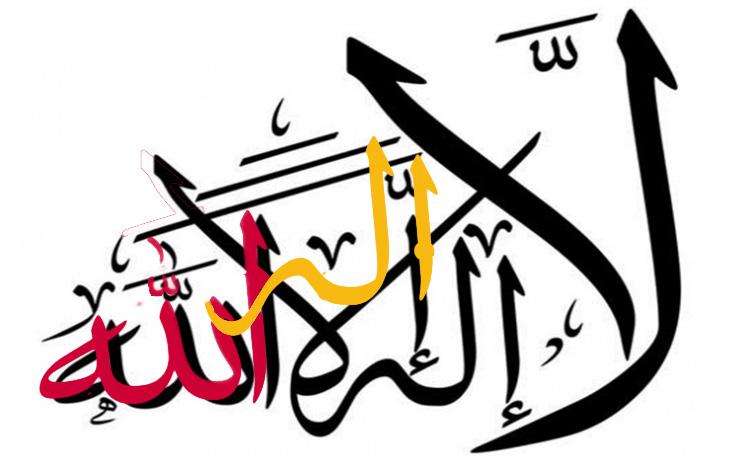
The Quran enjoins us to do an abundance of dhikr in many surahs. “O ye who believe, remember Allah abundantly (33:41)” is just one example.
But here is the issue.
If I only recite 33 Subhan Allah, 33 alhumdulillah, and 34 Allahu Akbar after every salat as prescribed in a hadith of Muslim (istihbab al-dhikr ba‘d al-salat), which takes me two minutes or even less, I have not performed an abundance of dhikr.
If anything, I restricted it. In accordance with the above Quranic injunction, should I increase the dhikr after salat to something more like 100 or even 1000 SubhanAllah, Alhumdulillah, and Allahu Akbar after every salat?
Actually, is that even allowed or would that be a bid‘a?
While the Quran encourages me to make an abundance of dhikr, the hadith puts a brake on it to a prescribed amount.
In fact, the Prophet’s s own devotions were measured. He himself says that he made istighfar 100 times a day (al-Mu‘jam alAusat, 3:288), and, in another hadith, once three Sahaba came to the wives of the Prophet s to ask about his daily devotions. They thought them to be insignificant and justified it saying, “What are
What is an of dhikr?
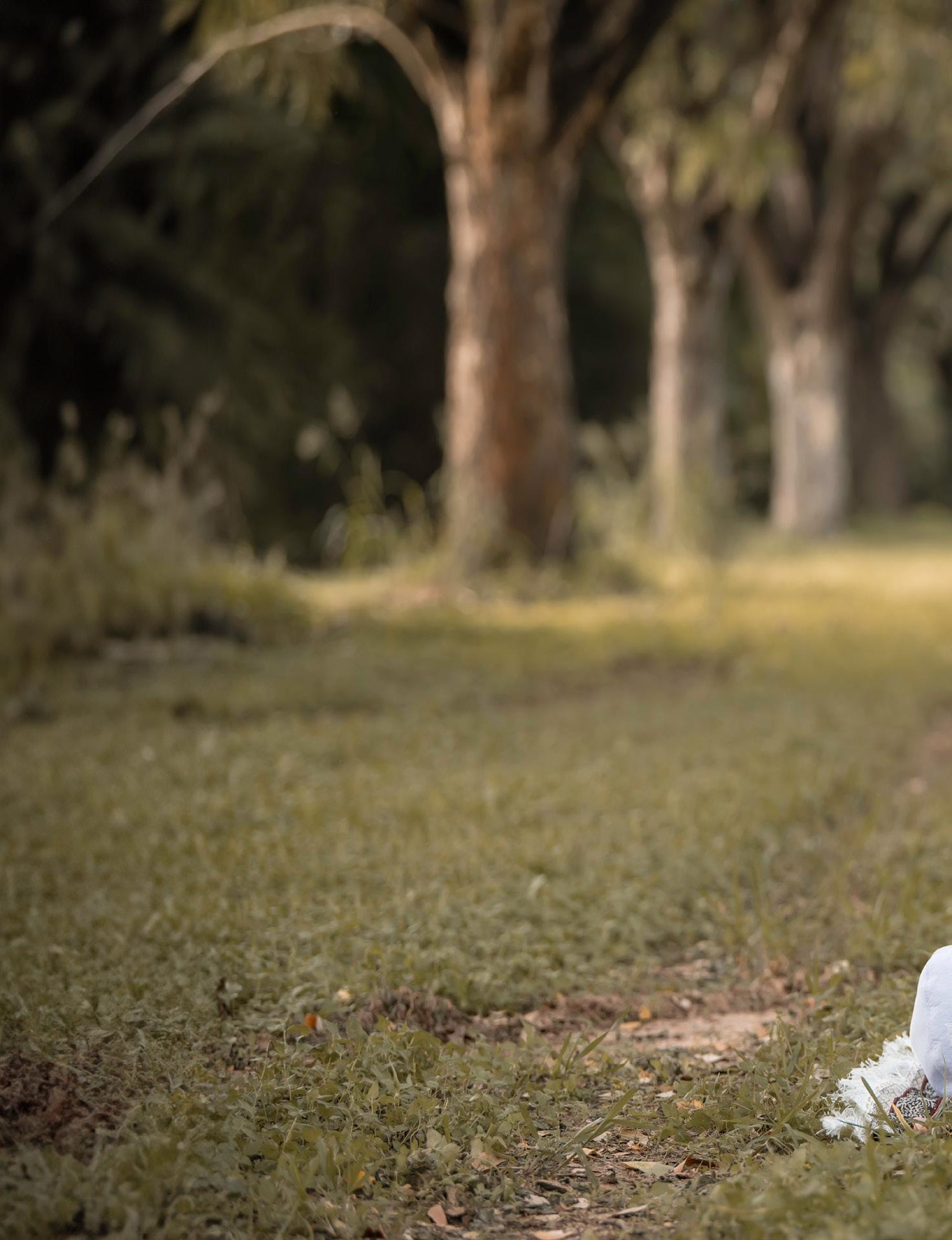
The Quran enjoins an The hadith restricts
34 INSIGHT MAGAZINE
by Abu Saalem
abundance
we in comparison to the Prophet s? All his past and future sins are forgiven” (Bukhari, targheeb fi alnikah).
It was clear that the Prophet s was not doing an abundance of dhikr.
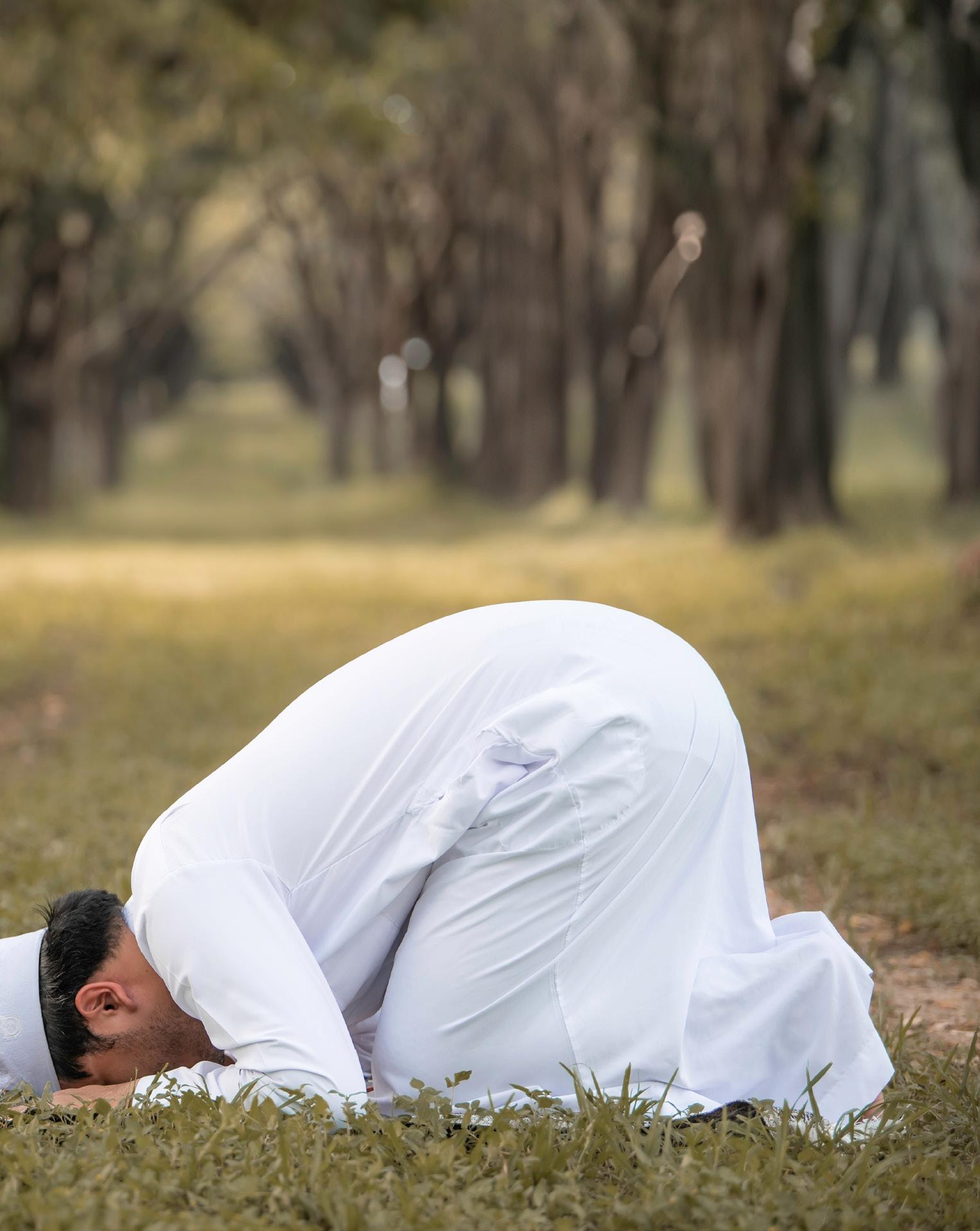
All this left me in a conundrum.
Does this mean that the meaning of a little or an abundance of dhikr is relative, or maybe the ayah is general in nature while the hadith is specific to certain occasions or states, or is my mind just manufacturing explanations to reconcile an apparent contradiction between Quran and Sunna?
35 INSIGHT MAGAZINE
an abundance of dhikr. it. What do we do?
It is obvious the Prophet s did not take the ayah on making an abundance of dhikr literally, otherwise he would never limit the amount of dhikr and would urge us to do as much dhikr as we possibly can. And even if he did prescribe a specific amount, he would still encourage us to push our limits to do more.
Though, the hadith says no such thing.
The problem resides in our innate tendency to interpolate time constraints into text. We find an example of this human tendency in the hadith. The Prophet s once saw a dream that he and the Sahaba were performing umra. Thereafter, they set off for umra in 4 AH, but Quraysh blocked their way and the Treaty of Hudaybiyyah was later signed. Umar g was unhappy. He asked the Prophet s,
He said, “Did you not tell us that we will go to the Baytullah and perform tawaf?”
The Prophet s said, “Yes, that is true
but did I also say that we will go to Baytullah this year” (Musnad Ahmad, 24:395)?
Notice that Umar g interpolated a timeframe to the prophetic injunction which prompted him to object.
This is precisely what we are doing with this ayah. We may think of an abundance of dhikr within a constrained timeframe.
But let us rid ourselves of timeframes and understand the ayah for what it says without interpolation.
The little that we do cumulatively adds up to an abundance of dhikr provided it is done on a consistent basis. No
Success is the and
36 INSIGHT MAGAZINE
consistent
timeframe added.
For example, if we take the tasbeehat Fatima and do the math:
33 x 5, 33 x5, and 34 x 5= 165+165+170= 500 a day.
Could you swallow that many pills a day? Each dhikr is a pill that provides spiritual nutrients to our souls and helps us maintain a healthy connection with Allah. Let us multiply the numbers:
For a week: 3500
A month: 14,000
A year: 168,000
Mind you, this is only the math for the cumulative tasbeehat Fatima. Every
the sum of small consistent efforts
other dhikr that is a part of your daily spiritual regimen is additional.
If someone told you they do 14000 tasbeehat a week, you would be impressed. The brother/sister is a saint!
But what if that saint is you?
That’s the miracle of following the Sunna. The Prophet s planned our dhikr routine that done consistently would translate into an abundance of dhikr. It is easy to be consistent on small dosages of dhikr then to hit a spiritual high, plan an abundance of dhikr in one go, and then go limp after two days. The Prophet s said, “For everything, there is a high [period of enthusiasm] and for every high there is a drop [listlessness]” (Tirmidhi: 4/365).
In summary, the key to an abundance of dhikr is consistency and the key to consistency is small amounts. The Prophet s said, “The best of good deeds are those that are done consistently though they are small in measure” (Ibn Khuzayma: 2/261).
37 INSIGHT MAGAZINE
The Prophet s himself was very consistent about his own routines.
Aus bin Hudhayfa g narrates that he was with the delegation that came to meet the Prophet s from Banu Thaqeef. He says that the Prophet s would come every day after ‘Isha and talked to us while standing for a long time until he would get tired and leaned on one leg or the other. One day, he came later than usual. We asked about the reason for the delay. He said, “I had a little left to recite of my daily routine of Qur’an and didn’t want to come before completing it” (Hayat al-Sahaba).
So, the ayah is teaching us an abundance of dhikr through consistency. But here is what happens (because it happened to me). When I came across the chapter on duas and dhikr on ‘before retiring to bed’, the duas and dhikr were so beautiful and relatable that I wanted to incorporate all of them. But I also knew that I needed to be practical and realize my limits. I would be exhausted after a few days and then would give up. Instead, I planned out how much I can take up consistently and then cherry-picked the duas and dhikr that I liked the most. Honestly, it was only three or four altogether, but I still do them to this day by the grace of Allah. Being realistic, understanding our limits and working with what we got is a Sunna. The Prophet s said, “Do not be hard on yourself that you are put into hardship” (Abu Dawud, fi al-hasad).

Two such examples are monasticism and celibacy which previous nations prescribed for themselves, but were unable to live up to.
Remember, the Prophet s didn’t teach us an encyclopaedia of du‘a and dhikr because he wanted us to incorporate everything into our daily routine. He knew that was practically impossible [for the most of us at least]. Even the Sahaba had a hard time keeping up. Abu Umama g once said to the Prophet
38 INSIGHT MAGAZINE
s, “Ya Rasulullah, you make so many dua‘ none of which we are able to save to memory.” The Prophet s then taught him a du‘a that incorporated all of his duas (Tirmidhi: 5/537)
One sahabi, Abdullah bin ‘Amr bin Aus j was a constant worshiper, spending his nights in prayer and his days in fasting. The Prophet s said, “You don’t have the ability to keep this up,” and then he reduced it (Riyadh al-Saleheen,
al-iqitisad fi al-ta‘a).
The point is he didn’t expect us to incorporate everything he taught us, but did want us to be consistent in all our selective devotions. Instead of taking all the duas and prescribed dhikr, pick the ones you love which you can maintain consistently, and stick with them for the rest of your life. Whatever is left out, your desire to incorporate them into your life is sufficient to guarantee you the reward for all of them.
In summary, an abundance of dhikr in the ayahs of Quran means consistent dhikr. Don’t let the whispers of Shaytan send you on a guilt trip for doing too little. You are doing an abundance of dhikr.
Just be consistent.
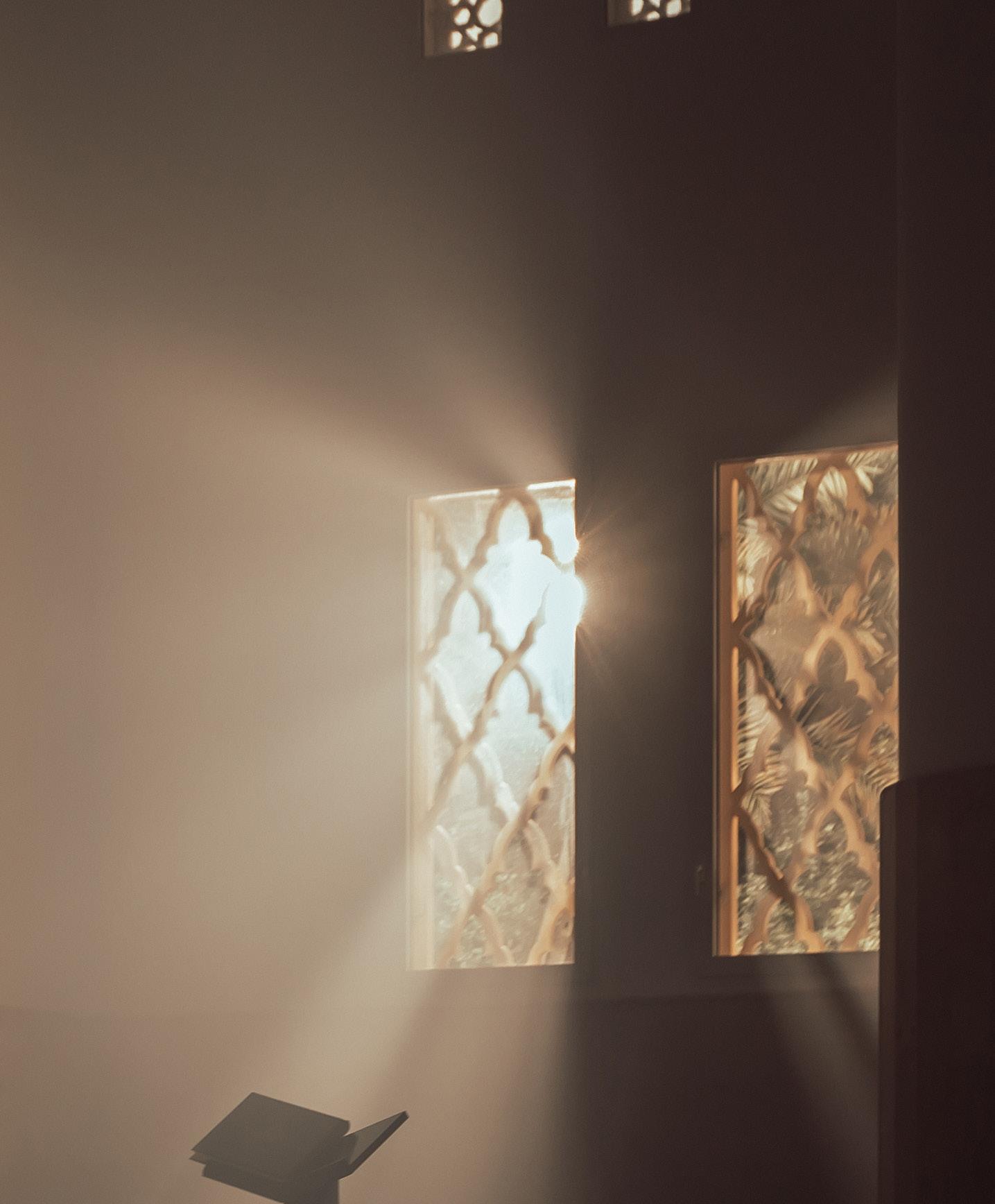
39 INSIGHT MAGAZINE
Being realistic, understanding our limits and working with what we got is a Sunna.


























 by M. Dr. Mateen Khan
by M. Dr. Mateen Khan













